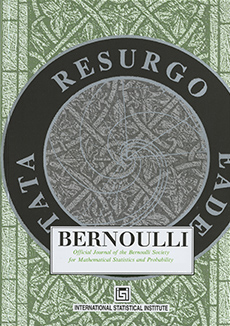Abstract
Weak convergence of the empirical copula process is shown to hold under the assumption that the first-order partial derivatives of the copula exist and are continuous on certain subsets of the unit hypercube. The assumption is non-restrictive in the sense that it is needed anyway to ensure that the candidate limiting process exists and has continuous trajectories. In addition, resampling methods based on the multiplier central limit theorem, which require consistent estimation of the first-order derivatives, continue to be valid. Under certain growth conditions on the second-order partial derivatives that allow for explosive behavior near the boundaries, the almost sure rate in Stute’s representation of the empirical copula process can be recovered. The conditions are verified, for instance, in the case of the Gaussian copula with full-rank correlation matrix, many Archimedean copulas, and many extreme-value copulas.
Citation
Johan Segers. "Asymptotics of empirical copula processes under non-restrictive smoothness assumptions." Bernoulli 18 (3) 764 - 782, August 2012. https://doi.org/10.3150/11-BEJ387
Information





